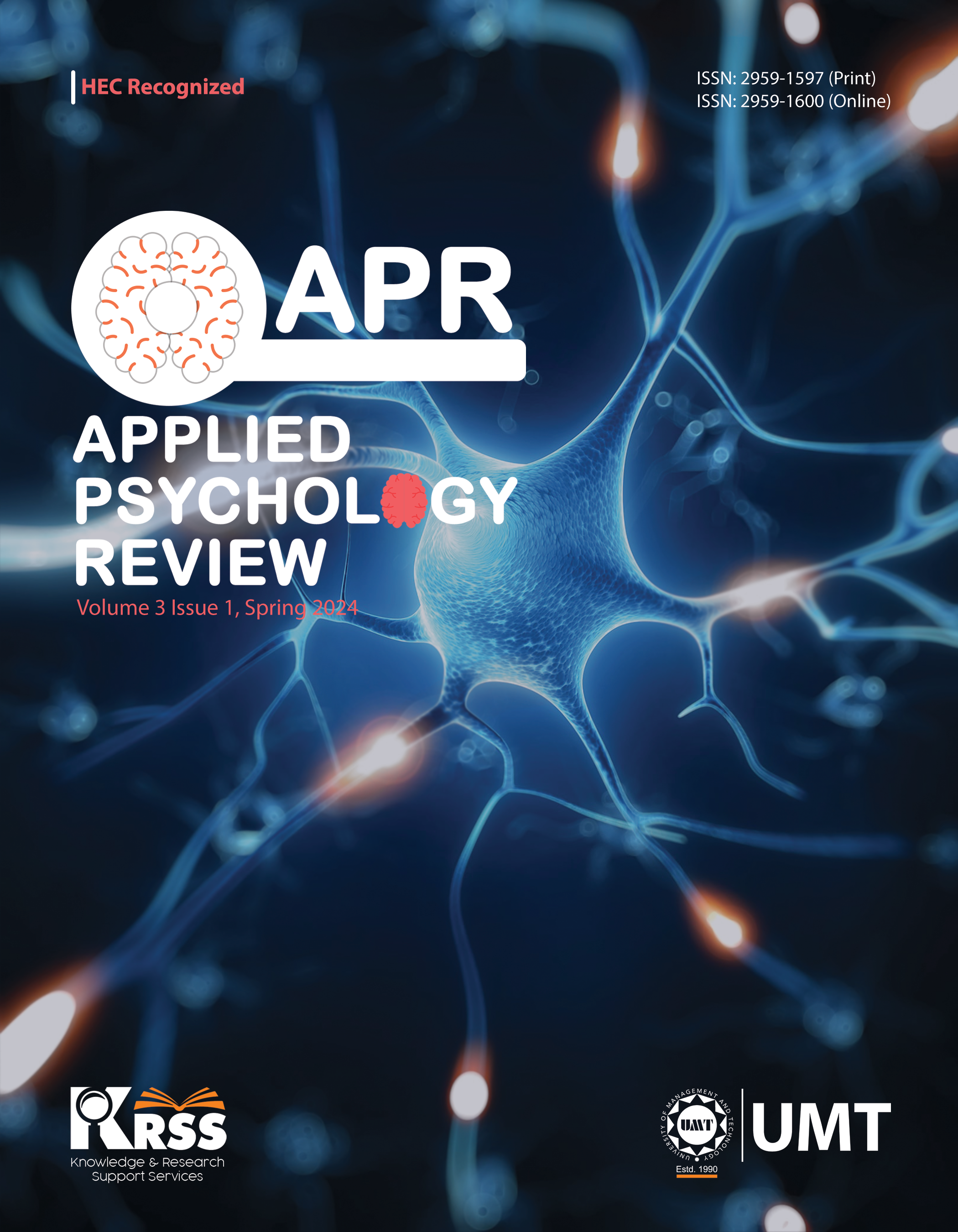Self-Silencing and Mental Well-being in Married Individuals
Abstract
 Abstract Views: 0
Abstract Views: 0
The present study investigated the relationship between self-silencing, co-dependency and mental wellbeing in married individuals. The objectives of this study were to explore the relationship between self-silencing, codependency and mental wellbeing in married individuals; and to investigate the mediating role of co-dependency between self-silencing and mental wellbeing in them. The total sample of the study comprised of 154 married individuals, including equal number of men and women, selected through convenient sampling strategy. The survey forms were sent online to the participants via interactive social media networks. Data was collected from the participants using the Mental Health Continuum Short Form, Self-Silencing Scale, and Spann Fischer Co-Dependency Scale. Pearson Product Moment correlation was computed which revealed a positive correlation between self-silencing and codependency, and a negative correlation between self-silencing, codependency and mental wellbeing in married individuals. Co-dependency was found to be the negative predictor of mental wellbeing. Moreover, co-dependency was found to be a significant mediator between self-silencing and mental wellbeing. These findings contribute to the behavioral sciences by providing evidence that the experience of self-silencing and co-dependency can negatively affect mental well-being of married individuals. As a result, it may impact their intimate marital bond.
Downloads
References
Adams, P., Abela, J. R. Z., Auerbach, R., & Skitch, S. (2009). Self-Criticism, dependency, and stress reactivity: An experience sampling approach to testing Blatt and Zuroff’s (1992) theory of personality predispositions to depression in high-risk youth. Personality and Social Psychology Bulletin, 35(11), 1440–1451. https://doi.org/10.1177/0146167209343811
Ahmed, F., & Iqbal, H. (2019). Self-Silencing and marital adjustment in women with and without depression. Pakistan Journal of Psychological Research, 34(2), 311–330. https://doi.org/10.33824/PJPR.2019.34.2.17
Ali, A., Toner, B. B., Stuckless, N., Gallop, R., Diamant, N. E., Gould, M. I., & Vidins, E. I. (2000). Emotional abuse, self-blame, and self-silencing in women with irritable bowel syndrome. Psychosomatic Medicine, 62(1), 76–82.
Ashraf, S., & Saleem, S. (2020). Emotion regulation, self-silencing and eating problems in young adults [Unpublished manuscript]. Department of Clinical Psychology, University of Management and Technology.
Bacon, I., McKay, E., Reynolds, F., & McIntyre, A. (2018). The lived experience of co-dependency: An interpretative phenomenological analysis. International Journal of Mental Health and Addiction, 18(3), 754–771. https://doi.org/10.1007/s11469-018-9983-8
Batool, N., & Hanif, R. (2019). An exploration of positive mental health levels among professionals in Pakistan: An indigenous perspective. Khyber Medical University Journal, 11(3), 145–51. https://doi.org/10.35845/kmuj.2019.19409
Besser, A., Flett, G. L., & Davis, R. A. (2003). Self-Criticism, dependency, silencing the self, and loneliness: A test of a mediational model. Personality and Individual Differences, 35(8), 1735–1752. https://doi.org/10.1016/s0191-8869(02)00403-8
Blatt, S. J. (2004). Experiences of depression: Theoretical, clinical, and research perspectives. American Psychological Association. https://psycnet.apa.org/doi/10.1037/10749-000
Carson, A. T., & Baker, R. C. (1994). Psychological correlates of codependency in women. International Journal of the Addictions, 29(3), 395–407. https://doi.org/10.3109/10826089409047388
Castilho, P., Pinto-Gouveia, J., & Duarte, J. (2015). Exploring self-criticism: Confirmatory factor analysis of the FSCRS in clinical and nonclinical samples. Clinical Psychology & Psychotherapy, 22, 153–164. https://doi.org/10.1002/cpp.1881
Cermak, T. L. (1988). A time to heal: The road to recovery for adult children of alcoholics. Avon Books.
Chapman, D. P., Perry, G. S., & Strine, T. W. (2005). The vital link between chronic disease and depressive disorders. Preventing Chronic Disease, 2(1), 2–6.
Cohen, J. R., Young, J. F., Hankin, B. L., Yao, S., Zhu, X. Z., & Abela, J. R. (2013). Personality predispositions in Chinese adolescents: The relation between self-criticism, dependency, and prospective internalizing symptoms. Journal of Social and Clinical Psychology, 32(6), 596–618. https://doi.org/10.1521/jscp.2013.32.6.596
Cramer, K. M., Gallant, M. D., & Langlois, M. W. (2005). Self-Silencing and depression in women and men: Comparative structural equation models. Personality and Individual Differences, 39(3), 581–592. https://doi.org/10.1016/j.paid.2005.02.012
Dear, G. E., Roberts, C., & Lange, L. (2004). Defining codependency: A thematic analysis of published definitions. In S. Shohov (Ed.), Advances in psychology. Nova Science Publishers.
Fischer, J. L., & Spann, L. (1991). Measuring codependency. Alcoholism Treatment Quarterly, 8(1), 87–100. https://doi.org/10.1300/j020v08n01_06
Gould, W. R. (2024, May 21). How to spot the signs of codependency: Over-Reliance on someone can be dysfunctional. Verywell Mind. https://www.verywellmind.com/what-is-codependency-5072124
Heron, M. (2018). Deaths: Leading causes for 2016. National Vital Statistics Reports, 67(6), 1–77.
Hurst, R. J., & Beesley, D. (2013). Perceived sexism, self-silencing, and psychological distress in college women. Sex Roles, 68, 311–320. https://doi.org/10.1007/s11199-012-0253-0
Jack, D. C. (1991). Silencing the self: Women and depression. Harvard University Press.
Jack, D. C., & Ali, A. (2010). Silencing the self across cultures: Depression and gender in the social world. Oxford University Press.
Jack, D. C. (2011). Reflections on the Silencing the Self Scale and its origins. Psychology of Women Quarterly, 35(3), 523–529. https://doi.org/10.1177/0361684311414824
Keyes, C. L., Wissing, M., Potgieter, J. P., Temane, M., Kruger, A., & van Rooy, S. (2008). Evaluation of the Mental Health Continuum–Short Form (MHC–SF) in setswana‐speaking South Africans. Clinical Psychology & Psychotherapy, 15(3), 181–192. https://doi.org/10.1002/cpp.572
Kiecolt-Glaser, J. K., & Newton, T. L. (2001). Marriage and health: His and hers. Psychological Bulletin, 127(4), 472–503. https://doi.org/10.1037/0033-2909.127.4.472
Kurtiş, T. (2010). Self-Silencing and well-being among Turkish women [Doctoral dissertation, University of Kansas]. Dissertations and Theses, Discover KU Scholarwork. https://hdl.handle.net/1808/6443
Maji, S., & Dixit, S. (2019). Self-Silencing and women's health: A review. The International Journal of Social Psychiatry, 65(1), 3–13. https://doi.org/10.1177/0020764018814271
Martsolf, D. S., Sedlak, C. A., & Doheny, M. O. (2000). Co-Dependency and related health variables. Archives of Psychiatric Nursing, 14(3), 150–158. https://doi.org/10.1053/py.2000.6387
Mann, M., Hosman, C. M., Schaalma, H. P., & de Vries, N. K. (2004). Self-Esteem in a broad-spectrum approach for mental health promotion. Health Education Research, 19(4), 357–372. https://doi.org/10.1093/her/cyg041
Marcussen, K. (2005). Explaining differences in mental health between married and cohabiting individuals. Social Psychology Quarterly, 68(3), 239–257. https://doi.org/10.1177/019027250506800304
McLafferty, M., Lapsley, C. R., Ennis, E., Armour, C., Murphy, S., Bunting, B. P., Bjourson, A. J., Murray, E. K., & O'Neill, S. M. (2017). Mental health, behavioural problems and treatment seeking among students commencing university in Northern Ireland. PLOS ONE, 12(12), Article e0188785. https://doi.org/10.1371/journal.pone.0188785
Nock, S. L. (1998). Marriage in men’s lives. Oxford University Press.
Nordgren, J., Richert, T., Svensson, B., & Johnson, B. (2019). Say no and close the door? Codependency troubles among parents of adult children with drug problems in Sweden. Journal of Family Issues, 41(5), 567–588. https://doi.org/10.1177/0192513x19879200
Reyome, N. D., Ward, K. S., & Witkiewitz, K. (2010). Psychosocial variables as mediators of the relationship between childhood history of emotional maltreatment, co-dependency, and self-silencing. Journal of Aggression, Maltreatment & Trauma, 19(2), 159–179. https://doi.org/10.1080/10926770903539375
Read, S., & Grundy, E. (2011). Mental health among older married couples: The role of gender and family life. Social Psychiatry and Psychiatric Epidemiology, 46(4), 331–341. https://doi.org/10.1007/s00127-010-0205-3
Tariq, A., & Yousaf, A. (2020). Self-Criticism, self-silencing and depressive symptoms in adolescents. Journal of Behavioural Science, 30(1), 60–76.
Uecker, J. E. (2012). Marriage and mental health among young adults. Journal of Health and Social Behaviour, 53(1), 67–83. https://doi.org/10.1177/0022146511419206
Walker, L. E. (1979). The battered woman (1st ed.). Harper & Row.
Waite, L. J. (1995). Does marriage matter? Demography, 32(4), 483–507.
World Health Organization. (2023). Stress. https://www.who.int/news-room/questions-and-answers/item/stress
Wright, P. H., & Wright, K. D. (1991). Codependency: Addictive love, adjustive relating, or both? Contemporary Family Therapy, 13(5), 435–454. https://doi.org/10.1007/bf0089049
Zhang, H., Watson-Singleton, N. N., Pollard, S. E., Pittman, D. M., Lamis, D. A., Fischer, N. L., Patterson, B., & Kaslow, N. J. (2017). Self-Criticism and depressive symptoms: Mediating role of self-compassion. OMEGA - Journal of Death and Dying, 80(2), 202–223. https://doi.org/10.1177/0030222817729609
Zuroff, D. C., Santor, D., & Mongrain, M. (2005). Dependency, self-criticism, and maladjustment. In J. S. Auerbach, K. N. Levy & C. E. Schaffer (Eds.), Relatedness, self-definition and mental representation. Routledge.
Copyright (c) 2024 Amara Naeem, Jawaria Bashir, Amarah Qureshi, Rabia Saleem

This work is licensed under a Creative Commons Attribution 4.0 International License.




